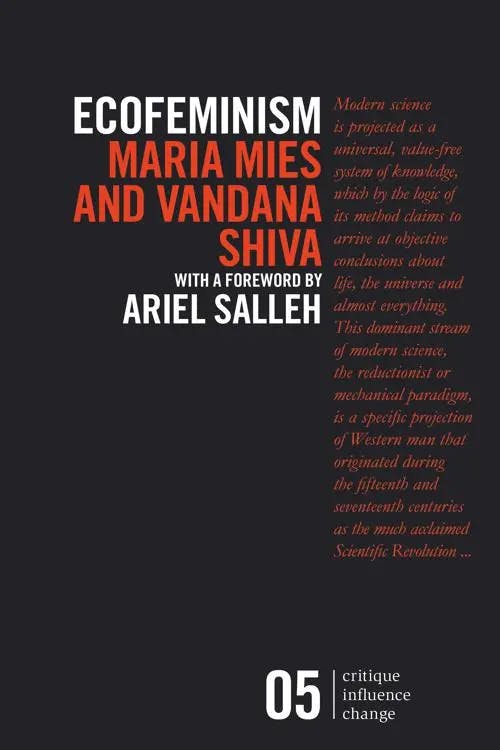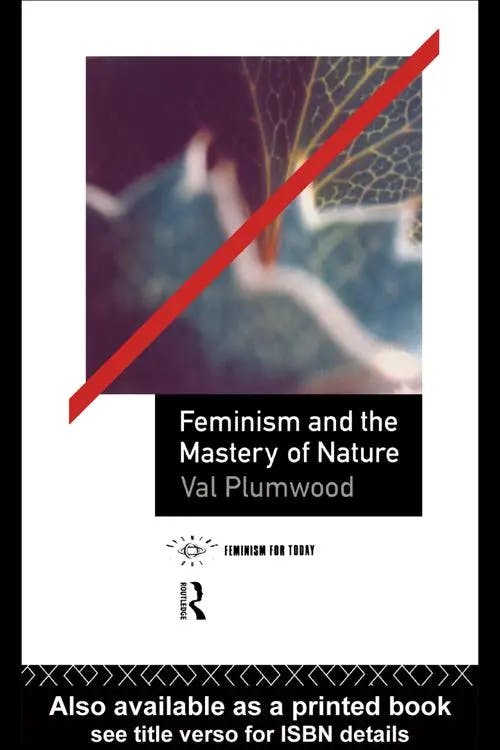What is Ecofeminism?
PhD, Environmental Humanities (University of Glasgow)
Date Published: 08.03.2023,
Last Updated: 09.01.2024
Share this article
Defining Ecofeminism
Ecofeminism, like most feminisms, is concerned with deconstructing, critiquing and eliminating systems of male-biased patriarchal oppression. More specifically, ecofeminism argues that these structures of oppression subordinate the natural world through the same mechanisms and logic as their subordination of women. Ecofeminism sees the erosion of wild places, declines in biodiversity, and rise in ecological disasters as inherently feminist concerns.
Indeed, as Greta Gaard demonstrates in her article Ecofeminism and Climate Change, ‘Gender inequalities mean that women and children are 14 times more likely to die in ecological disasters than men’ (23). Faced with such startling statistics, the need for a radical change in this dynamic is clear. It is precisely this shift which ecofeminism seeks to bring forth by interrogating these cascading layers of eco-gender inequality that pervade the industrial-capitalist world system.
The term ‘ecofeminism’ itself dates back to 1974, from Françoise d’Eaubonne, who coined the phrase “ecological feminisme” as a means of calling attention to women’s potential to bring about an eco-revolution. d’Eaubonne asserted that the marginalisation of women, people of colour and the poor were all tangled up in the systematic degradation of the natural environment & non-human world. It was not until the late 80s/early 90s however that ecofeminism truly began to gather steam and association as a discrete branch of feminism. Amongst the most oft-cited academic work on ecofeminism is Maria Mies & Vandana Shiva’s 1993 book Ecofeminism. Mies and Shiva’s book is concerned with clearly demarcating and structuring ecofeminist frameworks of thought:
"The impetus for writing came from analysing the causes which have led to the destructive tendencies that threaten life on earth. We became aware – quite independently – of what we call the capitalist patriarchal world system", they contend that, "this system emerged, is built upon and maintains itself through the colonization of women, of ‘foreign’ peoples and their lands; and of nature, which it is gradually destroying" (2014)
Vandana Shiva, Maria Mies
"The impetus for writing came from analysing the causes which have led to the destructive tendencies that threaten life on earth. We became aware – quite independently – of what we call the capitalist patriarchal world system", they contend that, "this system emerged, is built upon and maintains itself through the colonization of women, of ‘foreign’ peoples and their lands; and of nature, which it is gradually destroying" (2014)
Under this capitalist patriarchal world system, Mies & Shiva argue, ‘nature is subordinated to man; woman to man; consumption to production; and the local to the global, and so on. Feminists have long criticized this dichotomy, particularly the structural division of man and nature, which is seen as analogous to that of man and woman’ (5). The subordination of nature by man is seen as concomitant, or at least similar, to the subordination of woman by man. In their critique of this binary system, and the layers of oppression inherent to it, Mies and Shiva announce ecofeminism as ‘a woman identified movement…’ and they ‘…see the devastation of the earth and her beings by the corporate warriors, and the threat of nuclear annihilation by the military warriors, as feminist concerns’ (14).
What makes ecofeminism feminist?
This is one of the core questions that pervades ecofeminist writing and criticism. For ecofeminism to be ecofeminist, it must adhere to the intrinsic principles of feminism itself. Karen J. Warren, in her edited collection Ecological Feminism, suggests that;
what makes ecological feminism feminist is its twofold commitment to the recognition and elimination of male-gender bias wherever and whenever it occurs, and to the development of practices, policies and theories which are not male-gender biased. (1994)
It is crucial here to note that this is about eliminating gender-bias, any ecofeminism which seems to lean on, or reinforce, binaries between masculine/feminine is in very real ways not feminist, and thus not ecofeminist. Please see the section below ‘Criticisms of ecofeminism’ for more detail on this.
Another aspect of ecofeminism which chimes neatly with the broader principles of feminist thought, particularly in the 21st century, is that it is intersectional almost by definition. Intersectional feminism acknowledges and addresses the tangled web of injustices that pervades society – paying attention to the ways in which concerns and injustices of gender are woven into concerns and injustices of class, race and geography. For more information on the notion of Intersectionality, we can recommend Mary Romero’s Introducing Intersectionality as well as our own study guide introduction to intersectional feminism. With regards to ecofeminism, in its inherent disposition towards interpreting the world from more than one angle (i.e. ecologically and feministically), it champions an intersectional framework for interpreting, critiquing and solving feminist concerns.
What makes ecofeminism ecological?
Just as ecofeminism needs to adhere to core feminist principles and praxis, it’s important to also delineate what makes ecofeminism ecological. Warren is again of use here, asserting that ‘what makes ecological feminism ecological is its understanding of and commitment to the importance of valuing and preserving ecosystems (whether understood as organisms, individuals, populations, communities and their interactions, or as nutrient flows among entities “in a biospherical net of relationships”). This includes the recognition of human beings as ecological beings (as “relational and ecological selves”), and of the necessity of an environmental dimension to any adequate feminism or feminist philosophy’ (2).
Ecological thought, in essence, proposes that human beings are but one form of life among many others. We are all interdependently enmeshed with one another, and as such humans should act according to the needs of other critters that call this planet home. Just as feminism seeks to flatten power hierarchies of gender, ecocriticism similarly proposes that all lifeforms, from lichen to llamas, are of equal importance. In this mirrored commitment to dethroning systems of subjugation, be they the patriarchy or petrocultural-capitalist society, ecology and feminism are in a sense natural bed fellows. Indeed, ecofeminism helps highlight that the patriarchy is an endemic component of petrocultural-capitalist society. For ecofeminism to be genuinely ecological and feminist it must attend to this twin commitment of ecological and feminist thought; highlighting and eliminating male-gender bias, whilst highlighting and eliminating human species bias in turn.
Criticisms of ecofeminism
It is fair to say that ecofeminism has a somewhat chequered history, and, like many types of feminism, is hotly contested territory. Victoria Davion, in Is Ecofeminism Feminist?, pointedly argues that ‘at least some of the ideas coming from thinkers identifying themselves as ecofeminist are, in very important ways, not feminist. … These ideas glorify the feminine uncritically and thereby suggest that embracing a feminine perspective will help humans solve the ecological crisis. I argue that a truly feminist perspective cannot embrace either the feminine or the masculine uncritically, as a truly feminist perspective requires a critique of gender roles, and this critique must include masculinity and femininity’ (9).
Val Plumwood makes very similar arguments in Feminism and the Mastery of Nature;
some ecofeminists have endorsed the association between women and nature without critically examining how the association is produced by exclusion. On the other hand, some equality feminists, equally uncritically, have endorsed women’s ascent from the sphere of nature into that of culture or reason without remarking the problematic, oppositional nature of a concept of reason defined by such exclusions. (2002)
Val Plumwood
some ecofeminists have endorsed the association between women and nature without critically examining how the association is produced by exclusion. On the other hand, some equality feminists, equally uncritically, have endorsed women’s ascent from the sphere of nature into that of culture or reason without remarking the problematic, oppositional nature of a concept of reason defined by such exclusions. (2002)
Both Plumwood and Davion highlight the issues with certain forms of ecofeminism uncritically linking a sense of spiritual connection between women and nature, as well as uncritically endorsing an ascension or fissure of women from nature. Both of these dynamics fall back on gender binaries and stereotypes, and as such aren’t aligned with broader feminist principles of breaking down gender roles and stereotypes of this nature. As Davion neatly summarises, ‘for an analysis to be feminist, it is crucial…’ to ‘…acknowledge how “the feminine” is shaped by patriarchy and that it is not necessarily an independent category but may be a cluster of various traits emerging out of oppression’ (22). In short, for ecofeminism to be ecofeminist, it is crucial for it to not rest upon the binaries and systems of oppression it seeks to denounce.
In your own writing and research on ecofeminism, be attentive to these idiosyncracies – establishing binaries of masculine/feminine is rife with its own issues from a feminist perspective, and in that sense cannot truly be ecofeminist. Karen J. Warren’s aforementioned edited collection, Ecological Feminism, has plenty of articles which unpick and interrogate some of these intricacies, whilst forging ahead with productive new definitions and utilities for ecofeminist thought.
Ecofeminism in the 21st century
In a report from the UN, called Women, Gender Equality & Climate Change, it becomes bluntly apparent that on a dispersed global scale ‘women are more vulnerable to the effects of climate change than men’ (1). As per Gaard’s previously cited quote, women and children are 14 times more likely to die in ecological disasters than men. Such facts and analysis work as a caustic reminder of the widespread injustices which percolate through climatic change. The sense of agency tethered to climate change in the public consciousness is often inattentive to the various types of inequality and culpability wrought through the industrial-capitalist world system. Indeed, Gaard suggests that ‘to date, climate change discourse has not accurately presented the gendered character of first-world planetary overconsumption’ (20). Ecofeminism is utilised by Gaard as a means of reviewing and drawing attention to these inequalities that are reinforced through the systems responsible for disastrous climatic change, in this era being referred to as The Anthropocene.
Gaard goes further to suggest that, ‘climate change may be described as white industrial-capitalist heteromale supremacy on steroids, boosted by widespread injustices of gender and race, sexuality and species’ (27). Such viewpoints neatly summarise the uses of ecofeminist praxis for progressing responsibly in the troubling times of The Anthropocene. Ecofeminism is a framework which helps untangle the roots and systems which have produced, and continue to perpetuate, climate change. Any route out of our current predicament must be one that addresses the spectrum of inequalities that underpin it – be that the gap between the rich and the poor, the white colonial histories/realities of “conquest”, or the dissonance between human and animal rights.
If you are researching or writing your own essay on ecofeminism, or considering ecology and feminism separately of one another, be sure to think on the enriching interdependencies that underpin this intersectional ethos. Ecofeminism is critical of industrial-capitalist-patriarchal systems, and seeks to unpick the binaries of gender, race, sexuality and species oppression that hold such systems in place. As we forge forwards in the 21st century, such ecological feminist thinking is paramount to addressing many of our most pressing concerns and enduring injustices. With this in mind, think carefully on the ways that an ecofeminist lens could enrich, illuminate, or even complicate the arguments you are making in your own work.
We’ve suggested some further reading and external resources below should you wish to explore some more books and information on this topic.
Further Ecofeminism reading & resources on Perlego
Please see below for a suggested series of useful books for studying Ecofeminism, all available to Perlego subscribers.
- Contemporary Perspectives on Ecofeminism
- Ecofeminism, Second Edition: Feminist Intersections with Other Animals and the Earth
- Developing Ecofeminist Theory: The Complexity of Difference
- Ecofeminism
- Staying with the Trouble: Making Kin in the Chthulucene
External resources
- https://www.youtube.com/watch?v=hVbbov9Rfjg – Vandana Shiva lecture entitled ‘Ecofeminism and the decolonization of women, nature and the future’, San Telmo Museum 2020.
- https://read.dukeupress.edu/environmental-humanities/article/3/1/93/8116/Val-Plumwood-s-Philosophical-Animism-Attentive – Val Plumwood’s Philosophical Animism: Attentive Interactions in the Sentient World, Deborah Rose Bird, 2013
- https://www.youtube.com/watch?v=t6FuKhjfvK8 – Heidi Hutner TED Talk entitled ‘Eco-Grief and Ecofeminism’, 2015.
- https://www.newyorker.com/magazine/2014/08/25/seeds-of-doubt – Seeds of Doubt, Michael Specter, 2014.
- https://youtu.be/zbuLDAStSGk – ‘Part of the feast’: The life and work of Val Plumwood, by National Museum of Australia
Ecofeminism FAQs
What is Ecofeminism in simple terms?
What is Ecofeminism in simple terms?
Who coined the term 'ecofeminism'?
Who coined the term 'ecofeminism'?
Why is ecofeminism important?
Why is ecofeminism important?
Is ecofeminism actually feminist?
Is ecofeminism actually feminist?
Who are the most prominent writers on ecofeminism?
Who are the most prominent writers on ecofeminism?
Bibliography
Gaard, Greta. ‘Ecofeminism and climate change’ in Women’s Studies International Forum, vol. 49, 2015, pp. 20-33.
Available at: https://www.sciencedirect.com/science/article/abs/pii/S0277539515000321
Shiva, Vandana, and Maria Mies. Ecofeminism. 2nd ed. Zed Books, 2014.
Available at: https://www.perlego.com/book/2014326/ecofeminism-pdf
Warren, Karren J. ‘Introduction’ in Ecological Feminism, ed. Karen J. Warren.
Routledge, 1994, pp. 1-8.
Available at: https://www.routledge.com/Ecological-Feminism/Warren/p/book/9780415072984
Davion, Victoria. ‘Is Ecofeminism Feminist?’ in Ecological Feminism, ed. Karen J. Warren. Routledge, 1994, pp. 8-28.
Available at: https://www.routledge.com/Ecological-Feminism/Warren/p/book/9780415072984
Romero, Mary. Introducing Intersectionality. 1st ed. Wiley, 2017.
Available at: https://www.perlego.com/book/1536454/introducing-intersectionality-pdf
Plumwood, Val. Feminism and the Mastery of Nature. 1st ed. Taylor and Francis, 2002.
Available at: https://www.perlego.com/book/1621769/feminism-and-the-mastery-of-nature-pdf
UN. WomenWatch: Women, Gender Equality and Climate Change. N.D.
Available at: https://www.un.org/womenwatch/feature/climate_change/downloads/Women_and_Climate_Change_Factsheet.pdf
PhD, Environmental Humanities (University of Glasgow)
Toby Neilson has a PhD in the Environmental Humanities from The University of Glasgow. His research concerns The Anthropocene, and contemporary cinema’s relationship to it. Neilson’s research particularly focuses on science fiction films from an environmental perspective. He has lectured and published articles on ecocinema, film history, posthumanism and film philosophy.


